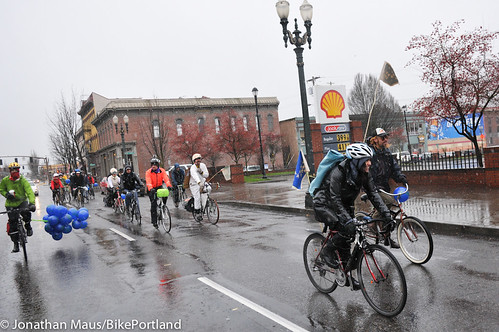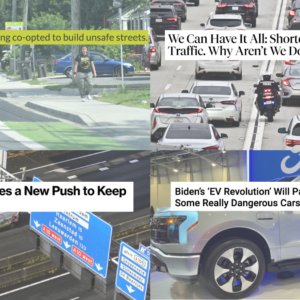Oregon keeps inching toward its goal of replacing or supplementing the gas tax it invented, back in 1919, with a Prius-proof mileage tax.
Next July 1, the first 5,000 volunteer drivers will get a chance to opt out of gas tax and into a so-called “usage charge.” As the state gets ready for that test, a meeting in Portland this Monday will be the last stop on a statewide tour to gather input about the concept.
It’s theoretically possible that a per-mile tax could eventually be made to vary based on location, creating an anti-congestion tool similar to the ones that have been effective in London, Singapore and San Diego. It’s also possible that the fees could vary by vehicle weight, which could preserve the gas tax’s energy efficiency incentives.
Oregon’s “2014 statewide listening tour” and the pilot project it’ll lead to are the results of a state law passed in 2013 that created the country’s first road usage charge program on a trial, opt-in basis.
Here’s the official summary of how the pilot program will work:
Oregon’s new road usage charge system will automatically collect mileage data from vehicles. Motorists will choose a mileage reporting device to interface with their vehicle and be paired with software to send mileage totals to a private account manager. ODOT will contract with private companies to maintain customer accounts, calculate charges and credits, and submit charges to the Oregon Treasury.
Advertisement
The basic reason for the experiment:
Funding for transportation system maintenance and construction has been declining in Oregon and around the country since the 1990s. This is due in part to more fuel efficient vehicles purchasing less gas, thus paying less in gas taxes – which go toward maintaining and building roads and highways.
Another factor here is essentially the same as the one behind Portland’s effort to create a new income tax for transportation: Americans are driving less, Oregonians most rapidly. Our drop in miles driven per person began in 1999, one of the earliest states to see this trend, and by 2011 it was down 18.7 percent, the biggest decline in the country. (That’s due both to our unusually car-lite cities and our unusually struggling rural areas.)
Even if vehicle efficiency weren’t rising, Oregon’s highway expansion schedule is premised on traffic volumes rebounding, and its road maintenance requirements depend on people continuing to pay into the system.
Next week’s meeting is Monday, Oct. 27, at Portland’s World Trade Center, 121 SW Salmon St. downtown, from 9 a.m. to noon. The state is inviting “business leaders, elected officials, city/county public officials, transportation representatives, media and other stakeholders” to attend.








Thanks for reading.
BikePortland has served this community with independent community journalism since 2005. We rely on subscriptions from readers like you to survive. Your financial support is vital in keeping this valuable resource alive and well.
Please subscribe today to strengthen and expand our work.
Whoa! Where do we sign up to volunteer for this? I’m very interested.
Anyone with a high-mileage car who signs up for this will be paying a surcharge; anyone with a gas hog who signs up for this will be getting a break on their contributions to maintaining and expanding the transportation system.
Consider the driver of a 40-mpg economy car driving 6000 miles per year. He/she buys 150 gallons of gas and pays $45 in Oregon gas tax. If he/she opts for 1.5 cents per mile, the mileage tax would come out to $75 for a year.
Consider the driver of the F150/Suburban/Expedition who drives the same 6000 miles but gets 15 mpg. He/she currently buys 400 gallons and pays $120 in Oregon gas tax. Under the mileage fee program, the F150/Suburban/Expedition driver would pay $75 – a $45 per year discount!
It looks like a good way to incentivize gas hogs and monster vehicles.
The supposed increase in fuel efficiency is vastly overstated. Yes, there are some high mileage cars, but three of the top 5 selling vehicles in the US are pick-up trucks, headed by the F150 for about the 30th year in a row.
Increase the gas tax.
It also incentivizes wasting gas by excessive idling or speeding.
The historical problem with gas taxes is that they are per-gallon instead of per-dollar. The gas tax should be a percentage of the price, not based on units of gasoline purchased. That way it automatically scales up as fuel prices rise.
The tax has tracked inflation fairly well as is. What it hasn’t tracked well is the size, complexity, and expense of the highway system, or the movement to defund government generally over the last 40 years.
The gas tax has NOT tracked inflation well at all. In 1993, the last year the federal gas tax was increased, the federal tax was 18.4 cents per gallon and the Oregon tax was 24 cents per gallon. In the last 21 years, the federal gas tax has NOT INCREASED AT ALL. The Oregon gas tax was finally increased in 2011 to 30 cents per gallon (a 25 percent increase).
On the other hand, the Corps of Engineers’ construction cost index for highways, streets and bridges has increased by 70 percent since 1993.
Inflation of road projects in 21 years: 70 percent
Increase in Oregon gas tax: 25 percent
Increase in federal gas tax: 0 percent
The gas tax has NOT increased with inflation.
1919: $0.05
2014: $0.49
Inflation since 1919 is about 13x. Which makes a nickel worth about 65 cents. Not perfect, but pretty good for a tax that actually requires political will to raise.
And to be clear, I’m in favor of raising it. But the basic problem is not that we’re buying more efficient vehicles or driving less or even that the gas tax has been neglected, even if those are all true facts. The problem is we built a highway system at a time when a system of progressive taxation could fund massive public works and investment, and now we live in the time of the Tea Party.
Actual Oregon gas tax in 1919 was one cent. It didn’t increase to 5 cents per gallon until 1933.
If you want to use 1933 as the base and the consumer price index (instead of the construction cost index), the Oregon gas tax should be 91 cents per gallon.
The gas tax has not been increasing in line with inflation for at least the last 80 years.
By the way, what’s the possibility that the legislature would increase the mileage-based fee consistent with inflation? Slim to none, in my opinion.
This. It punishes fuel efficient vehicles.
Anyone who has an electric car is really getting the short end of the stick. I still say raise and keep the gas tax for all hybrids and standard internal combustion vehicles. I would be ok with charging electric vehicles per mile the amount they would pay in gas tax at their eMPG (commonly in the 100-120 range). This comes out at 6,000 miles per year (at 100 eMPG, equivalent to 60 gallons of gas) you would pay $15-$18 a year.
What about a weight x mileage tax like commercial trucks?
I’m hoping it won’t be too long before the DMV requires devices in every vehicle that record all the controls and movement to be used in case of a collision… every motor vehicle should have a black-box like airplanes so that they can be held accountable… want to drive like a maniac? pay for it…
This intuitively makes sense, but….the highest risk group, young males, is most likely to be involved in single car accidents, so it doesn’t really help vulnerable road users.
This model doesn’t attempt to encourage people to pay attention, drive slow and wander all over the road? It doesn’t track it.
If you look at people who have run over and killed cyclists in the last year in Oregon, I’d be willing to wager that those people generally drive “safe” by this measure.
edit:
This model doesn’t attempt to encourage people to pay attention. Drive slow and wander all over the road? It doesn’t track it.
A pure per-mile tax is extremely inequitable, and I hope vehicle weight is taken into account. Still, even a weight-mileage tax is a klutzier way to accomplish what an appropriate gas tax does in the first place.
Boooooo, VMT.
for all of the hate of this out there, the electric cars on the road are currently paying no tax on their energy. They are starting to become a substantial part of the fleet especially in the Portland area
Not to mention all the free charging stations around the city.
a lot of those charging stations require an account with the charging company though, don’t they? I looked at one a few weeks ago because I was curious and it wanted you to enter in your specific PIN and info.
It doesn’t make sense that businesses would just allow you to charge up for free. Makes sense though if the charging companies lease space in their parking lot.
First, electric vehicles are contributing to the transportation system maintenance and operations. Electric vehicles need to be licensed and their drivers need to be licensed. The two-year fee is $86 plus $38 for those of us who live in Multnomah County. Your driver’s license is another $6+ per year. In case you think those fees are inconsequential, consider that fees account for more of ODOT’s revenues than the truck weight mile tax! ODOT’s two-year budget includes $1.1 billion from fuel taxes; $0.67 from fees and $0.61 from weight mile taxes paid by trucks.
Second, if you check your PGE bill, you’ll see that you are paying taxes to Portland, Multnomah County and others for the energy you consume. So, if you’re charging your electric vehicle at home you are paying some taxes. Maybe the revenue not directed to the transportation system, but you are paying something for your energy.
I haven’t found anything that indicates the proportion of electric vehicles on the road in the Portland metro area, but statewide, it’s still less than 1/2 of one percent. If you want to tack on a surcharge on the Oregon license plate renewal fee, go for it. Some states have done so. It’s a much cleaner way of getting some revenue directly from the drivers of electric vehicles. Making everyone participate in an expensive system to solve this miniscule problem is not cost effective.
Finally, if you’re concerned about electric vehicles not contributing to the maintenance of the transportation system, why are we incentivizing their purchase with a $1500 tax credit at time of purchase? That’s the same as giving away 100,000 miles fees at 1.5 cents per mile. Why not cancel that tax credit and call it even?
for all the <1% of vehicles on the road that are electric …
Electric vehicles do pay a tax on the electricity they purchase. Check your next electric bill.
Pure silliness from our leaders. Just buck up and raise the freaking gas tax already! Why go through the rigamarole of trying to collect an unfair tax from millions of individuals when one is ALREADY in place, that is collected from thousands of sources ( guessing, not sure how many gas stations there are in Oregon), and punishes gas hog vehicles? And how do out of state vehicles pay for their use of Oregon roads?
“ODOT will contract with private companies to maintain customer accounts, calculate charges and credits, and submit charges to the Oregon Treasury”.
Just as long as that private company is not Oracle…
This seems an appropriate way to fund infrastructure, hitting right at the heart of the matter, the wear and tear of the roads. I don’t care what MPG your car gets (environmental concerns aside), I am concerned with covering the cost of maintenance brought about by actual street volumes and usage patterns.
Then you should agree that this is incredibly flawed, because it does not factor vehicle weight.
Ah, I’d interpreted that as a possibility under consideration.
Why don’t we just skip this level of Big Brother and go directly to imbedding a device on each person, then we can keep track of everything.
You’re kidding right? What do you think the hundreds of millions of gov’t tracked miniature computers that everyone has in their purse or pocket are for?
I’m still not convinced that this isn’t simply a means of solving a political problem (politicians can’t figure out how to adjust the gas tax to match inflation) with a technological “solution”.
The real brilliance of VMT policy discussion is that for years it has been something to talk about, study, or pilot, which makes politicians appear to be doing their job, when in reality politicians are supposed to overcome political problems and they have yet to do so when it comes to transportation funding.
To be fair to ODOT, they don’t raise the taxes-are-too-low revenue problem in their brief on this issue. They raise the structural problem of taxing a type of fuel that’s slowly being phased out. That is indeed a problem, though arguably a less pressing one.
I conflated the two problems a bit in my post, but I’m regretting it a little bit because they are, genuinely, different problems.
A statewide gas tax increase is very likely to be on the table in the next legislative session.
How much would Emily Finch pay?
Perhaps they should consider a fee that tries to address all the effects once the shift is made, a fee that includes:
– mileage,
– weight,
– pollution/ energy impact surcharge,
– SOV surcharge, and
– time of day / peak hour surcharge.
and a road visitor fee (for vehicles not licensed in the state)…as communities always try to collect fees from users who do not pay the on-going costs of establishing the service (and do not vote locally too).
a gas tax collects from visitors
I don’t think a mandatory vehicle-tracking program would survive public anger. I would never sign up for it voluntarily and I doubt the majority of people would.
Raise the gas tax, and figure out some way to charge a per-mile tax as part of the annual vehicle registration.
We’re pretty low-car, but we rent our car out through Getaround. I’d have to raise my rental price, or I’d end up paying for other people who are driving my car. Under the current system the amount would be kind of hard to figure out because we charge by the hour or day.
I’m waiting to see what happens when the legislature attempts to pass a gas tax substitute on those living completely car-free. If driving continues to decline, this usage-based system might only be seen as a band-aid at best, especially since opt-in is voluntary.
I think Portland is doing that already.